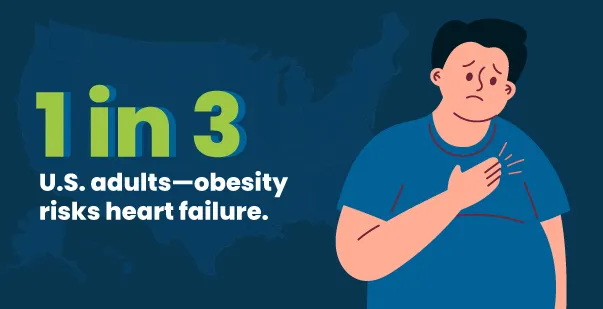You may not think twice about gaining a few extra pounds, but what if that weight was quietly putting your heart at risk? Many people think of obesity as just extra weight, but it’s far more dangerous than that. Obesity is a major contributor to heart disease, high blood pressure, diabetes, and even sudden cardiac arrest. A PubMed study found that obese individuals have twice the risk of a fatal heart attack compared to those with a healthy weight.
Why? Because excess fat forces the heart to work harder, leading to chronic inflammation, clogged arteries, and weakened heart function. Over time, this increases the chances of a deadly cardiac event. With World Obesity Day highlighting this crisis, it’s crucial to understand how obesity directly impacts your heart health and life expectancy.
Now, let’s explore the numbers, obesity and cardiac risks and how you can reduce your chances of heart disease and contribute to cardiac arrest prevention.
Obesity is More Than Just Excess Weight
Obesity is a medical condition where excess body fat significantly increases health risks. Doctors classify it using Body Mass Index (BMI):
- Overweight: BMI between 25 and 29.9
- Obese: BMI of 30 or higher
Obesity affects how your body functions, often causing insulin resistance, hormonal imbalances, and chronic inflammation. These changes increase the risk of type 2 diabetes, heart disease, and other serious conditions. This isn’t just a cosmetic concern. Obesity is a complex health issue that needs attention and proper management.
Why Does Heart Health Begin on the Scale?
Every year on March 4th, World Obesity Day raises awareness about the global obesity epidemic and its impact on health. While obesity is often linked to lifestyle and diet, it plays a far more critical role in heart health than many realize. As per NCBI, early 1 in 5 children in the U.S. is obese, increasing their lifetime heart disease risk.
According to the Centers for Disease Control and Prevention (CDC), obesity-related illnesses cost the U.S. $173 billion annually, with heart disease being a primary contributor. World Obesity Day is not just about raising awareness; it’s about action. Thus, by tackling obesity head-on, we can significantly reduce the burden of heart disease and create a healthier future for all.
Here’s what Obesity Day tells us about heart health:
- Obesity is a Cause of Heart disease
When a person carries excess weight, their heart must work harder to pump oxygen-rich blood throughout the body. This increased workload leads to a thickening of the heart muscle, known as left ventricular hypertrophy, which weakens heart function over time. As a result, the heart becomes overworked and more prone to heart failure and cardiac arrest.
- Obesity Causes High Blood Pressure and Artery Blockages
Obesity is also a leading cause of hypertension. The excess fat tissue increases vascular resistance, forcing the heart to pump harder. This constant pressure weakens blood vessels, making them more susceptible to ruptures, clots, or blockages. Blocked arteries reduce oxygen supply to the heart, increasing obesity and cardiac risk, which can quickly lead to cardiac arrest.
- Obesity Causes Diabetes and Insulin Resistance
Another major consequence of obesity is its strong link to type 2 diabetes, a condition that significantly contributes to cardiovascular disease. Diabetes damages blood vessels, increasing their vulnerability to blockages while also causing widespread inflammation that weakens the heart. Diabetes-related nerve damage can interfere with normal heart function, further increasing the risk of an irregular heartbeat, heart attack, or cardiac arrest.
- Obesity Causes Sleep Apnea
Many people with obesity also suffer from obstructive sleep apnea, a condition where breathing repeatedly stops during sleep. This leads to lower oxygen levels, increased blood pressure spikes, and a higher risk of arrhythmias, which are irregular heartbeats that can trigger cardiac arrest. Over time, untreated sleep apnea weakens the heart, making sudden cardiac death more likely.
- Obesity Causes High Cholesterol
High cholesterol is another significant issue among those with obesity. Excess weight contributes to higher levels of LDL cholesterol, which leads to the buildup of plaque in the arteries. This is a condition called atherosclerosis. As arteries narrow, blood flow to the heart is restricted. If a plaque deposit ruptures, it can cause a heart attack, which may quickly escalate into cardiac arrest.
- Weight Loss Improves Heart Health
Here’s a fun fact: you don’t need to lose half your body weight to make a difference. Even a 5–10% weight reduction can lower blood pressure, improve cholesterol levels, and reduce heart disease risk. Even small reductions in weight help improve blood circulation, reduce inflammation, and enhance overall cardiovascular function. What’s important is consistency over intensity.
The Importance of Prevention & Awareness
World Obesity Day is about recognizing the growing obesity crisis and taking action at both individual and societal levels. While personal choices such as a balanced diet, regular exercise, and mindful lifestyle habits play a crucial role, addressing obesity also requires wider public health initiatives. Governments and organizations must work toward improving access to nutritious foods, promoting active lifestyles, and implementing policies that encourage preventive healthcare. Spreading awareness about the link between obesity and heart disease is the first step toward change.
Read More: Heart Disease: Facts and Statistics You Must Know
Early Warning Signs of Obesity
Many people think heart disease develops slowly and comes with clear symptoms. But for some, especially those with obesity, the warning signs can be silent and dangerous. Let’s explore what these early warning signs are: .
- Shortness of Breath: Feeling out of breath during mild activity is often an early sign of heart strain. When the heart struggles to meet the body’s oxygen needs, even simple tasks can leave you gasping for air.
- Irregular Heartbeats (Arrhythmias): Obesity can change the structure of the heart, leading to irregular heart rhythms. Many people ignore occasional palpitations, but these may signal atrial fibrillation. It is a condition that raises the risk of stroke and heart attack.
- Chest Discomfort or Tightness: Extra fat around the chest and abdomen can compress internal organs, which leads to a sensation of tightness. In some cases, this discomfort may suggest restricted blood flow to the heart.
- Swelling in the Legs and Feet: Obesity can cause fluid retention by impairing circulation and increasing pressure on veins, which leads to swelling in the lower extremities. This may indicate worsening heart function and should not be ignored.
- Hypertension: High blood pressure, or hypertension, is often called the “silent killer” because it typically has no noticeable symptoms until it causes significant damage to the heart, arteries, or other organs. It is one of the leading risk factors for heart disease, stroke, and other cardiovascular complications.
Preventative Measures for a Healthier Heart
A report by Medical News Today shows that people with obesity have a 60% higher risk of heart disease than those with a healthy weight. Extra body weight makes the heart work harder to pump blood. Over time, this increases blood pressure and raises the risk of heart failure. So, proper weight management is very important. These are some strategies focused on cardiac arrest prevention that you can follow:
Eat a Heart Healthy Diet
What you eat plays a big role in heart health. Cut back on processed foods, excess salt, and unhealthy fats. Instead, focus on whole foods, lean proteins, and omega-3-rich sources like fish and nuts. These choices maintain healthy cholesterol levels and help with weight management.
Stay Active
Regular exercise keeps your heart strong. Aim for 150 minutes of moderate exercise per week. Go for brisk walks, cycling, or swimming. Staying active will improve your circulation, help you with weight management, and reduce stress on your heart.
Manage stress
Chronic stress can take a toll on your heart. Try out mindfulness meditation, and build strong social connections to help lower your blood pressure. Even simple activities like deep breathing or spending time with loved ones can make a big difference.
Avoid Smoking and Limit Alcohol
Smoking damages blood vessels and raises the risk of heart disease. If you smoke, quitting will be the best thing you can do for your heart. Drinking too much alcohol can also lead you to develop high blood pressure and other heart-related problems. So keep these things in check to protect your heart.
Get Regular Health Screenings
Routine checkups can help you catch problems early. Make sure that you monitor your blood pressure, cholesterol, and blood sugar levels regularly. If something is off, you can take action before it leads to major health issues.
Read More: Key Signs of a Heart Attack Every Woman Should Know
Obesity and Cardiac Arrest: A Wake-Up Call
Obesity rates are climbing, and with them, the risk of heart disease and sudden cardiac arrest. World Obesity Day is a reminder that you need to take action for your health. You need to do this both as individuals and as a society.
You can lower your obesity and cardiac risk by making simple lifestyle changes. Maintaining a healthy lifestyle, like eating a balanced diet. Also, monitoring important health indicators like blood pressure and cholesterol all have an impact. Even small adjustments can help.
When you take charge of your health and support awareness efforts, you contribute to a larger movement. Educating yourself on life-saving techniques, such as AED CPR Certification Online, can further prepare you to respond to cardiac emergencies effectively. It’s time to take charge of your health. Start today.



 03/12/2020
03/12/2020

